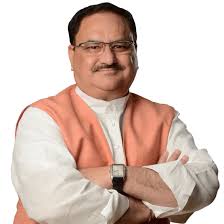
Nadda Takes Action on Heatwave Preparedness
In response to the ongoing heatwave affecting various parts of the country, Union Health Minister J.P. Nadda convened a meeting with senior officials of the Health Ministry today to review the situation and assess the readiness of hospitals to manage heat wave-related health issues.
Minister Nadda emphasized the importance of preparedness and directed officials to ensure that hospitals are fully equipped to provide optimal care to those affected by extreme heat. He mandated the establishment of special heatwave units in central government hospitals to enhance response capabilities.
Following the minister’s directives, the Health Ministry issued an advisory outlining essential measures for state health departments during the 2024 heatwave season. The advisory targets State Nodal Officers under the National Programme for Climate Change and Human Health (NPCCHH) and calls for the dissemination of guidelines such as the National Action Plan on Heat-Related Illnesses and the National Disaster Management Authority (NDMA) guidelines to all districts.
States are urged to implement and support district-specific and city-level heat-health action plans, ensuring preparedness and timely response. To facilitate this, states and districts should organize task force meetings to update and approve heat-health action plans, incorporating these into broader state action plans on climate change and health.
From March 1, 2024, daily data submission on heatstroke cases, emergency attendance, and deaths must be reported on the IHIP portal. Health facilities are required to maintain detailed digital records of heatstroke cases and conduct investigations of suspected heat-related deaths. Heatwave warnings issued by the India Meteorological Department (IMD) should be communicated to health facilities and vulnerable populations. Public health advisories and informational campaigns will be conducted to raise awareness about precautions against extreme heat.
Training for medical officers, healthcare staff, and community health workers on heat-related illness symptoms, case management, and emergency cooling measures will be prioritized. Adequate supplies of ORS packs, essential medicines, IV fluids, and cooling equipment should be procured. Hospitals must ensure sufficient drinking water and cooling appliances are available and functioning.
Special measures should be taken to prevent and manage heat-related illnesses during mass gatherings and sporting events. This includes ensuring adequate water supply, cooling shelters, and health promotion activities.
The Health Ministry's comprehensive approach aims to mitigate the health impacts of the heatwave by enhancing the readiness of health facilities and increasing public awareness. Minister Nadda's proactive measures underscore the government's commitment to protecting public health during extreme weather events.